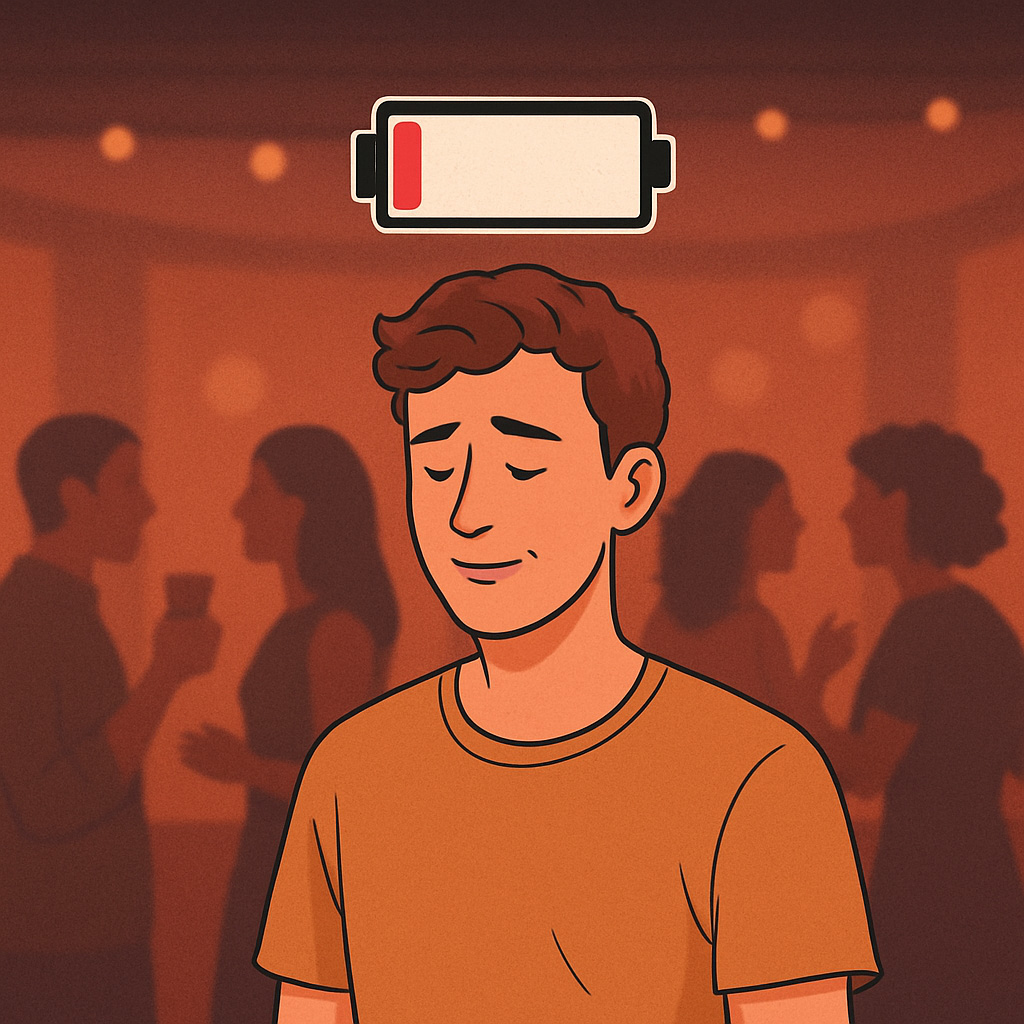
Imagine your energy as a battery.
Every morning, you wake up with a certain charge. And as you go through the day, various activities pull power from this battery, like work, noise, decisions, messages, and emotions. Social interactions, even joyful ones, are part of that.
But here’s the thing: some people’s batteries drain faster in social settings.
It’s like using an app that’s beautiful and fun but runs in high-performance mode, so it consumes more energy than it appears to.
Now, in reality, what this looks like is that you laughed, connected, and even had moments when your heart felt full.
And yet, you feel completely drained on your way home or as soon as the door clicks shut behind you. Your body feels heavy, and your mind goes quiet. You start to replay conversations, wonder if you said the wrong thing, or just sit silently, wanting nothing more than to be alone.
If this sounds familiar, then at some point, you must have also asked yourself, “But I had fun, so why am I tired?” You must have felt confused when there was no answer, so let’s try to understand it.
Most of us are taught that fun equals energising. That connection should always feel good, and good things shouldn’t exhaust us. But emotional truths aren’t this binary or black-and-white.
You can love your friends and still need silence.
You can be the life of the party and still feel empty afterwards.
You can laugh loudly and still go home quietly questioning yourself.
This post-social fatigue is especially common if:
- You’re highly empathetic and absorb others’ emotions like a sponge
- You’ve been masking parts of yourself to feel accepted
- You’re managing internal anxiety during conversations
- You’ve experienced past social rejection or trauma
- You’re introverted or neurodivergent
- You don’t feel psychologically “safe” in certain social circles.
Even positive experiences require emotional labour. For a moment, picture yourself carrying an invisible emotional backpack into every interaction.
Some people walk in light, barely noticing their bag. Others carry backpacks loaded with self-doubt, fear of judgment, past social wounds, or the pressure to “perform.”
When you’re with others, especially in groups, you may constantly be:
- Monitoring reactions
- Overthinking your words
- Reading the emotional temperature of the room
- Making sure everyone’s okay
- Smiling through discomfort
- Trying not to be “too much” or “too quiet”
That’s a lot of weight to carry for hours, and even if no one notices, you feel it, and it costs you.
So, what is really happening?
After socialising, your nervous system often shifts from a state of social engagement (where you’re outward-focused and animated) to decompression (where your body starts processing everything it just went through).
For some people, especially those with a history of emotional overwhelm or sensory sensitivity, this decompression can feel like a crash.
- You may feel foggy or irritable
- You may zone out, need solitude, or go numb
- You may feel shame or confusion for not “bouncing back”
The “Post-Social Crash” doesn’t mean something’s wrong. It means you’re attuned. Your system needs space to reset. So, here are a few strategies that can help:
- Pre-Social Grounding: Before going out, spend a few minutes grounding yourself. Deep breaths, a calming ritual, or setting an intention (“I don’t need to be everything for everyone”) can help.
- Honour Your Social Limits: You don’t have to say yes to everything. You don’t need to stay until the end. Leaving early isn’t rude. It’s responsible if you’re protecting your peace.
- Plan Buffer Time: Don’t schedule back-to-back events. Create soft landings. Give yourself quiet space afterwards to decompress without guilt.
- Check the Emotional Backpack: Afterwards, reflect: What felt heavy? What felt authentic? Are there people you feel safer with? These reflections can guide future social choices.
- Build in Rest as a Requirement, Not a Reward: Rest isn’t something you “earn.” It’s something you need. Normalise rest after socialising and without shame.
Needing rest after meeting people doesn’t make you weak. It makes you human. In a world that rewards constant output and smiling through it, learning to listen to your inner cues is radical self-respect.
So the next time you feel drained, even after a good time, don’t rush to judge yourself. Instead, say: “Thank you, body, for telling me what you need. I’m listening.”
And if this resonates, and you find yourself constantly emotionally drained or unsure how to set boundaries in social spaces, you’re not alone.
Therapy can be a safe space to unpack this. You deserve relationships, even with yourself, that leave you restored, not empty.
Book a consultation session today here because you don’t have to figure this out alone.

